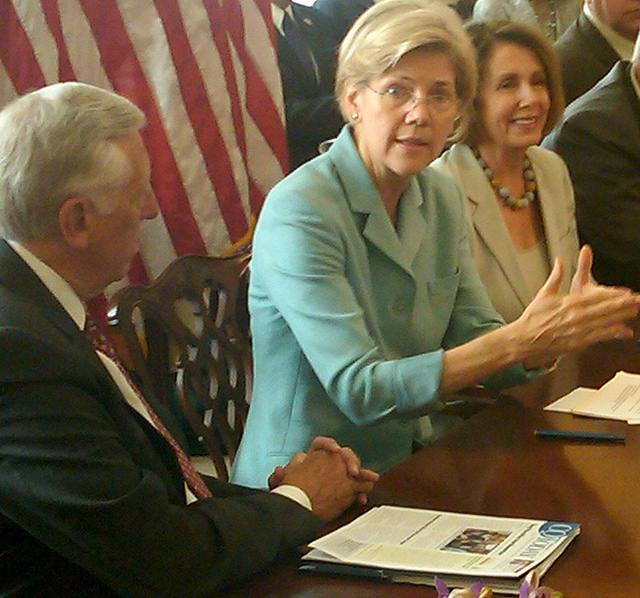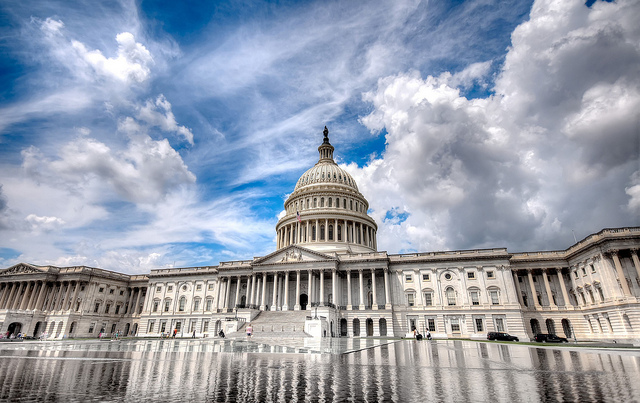The 113th Congress has passed legislation allowing losses incurred by derivatives trading to be covered by the FDIC. President Obama is expected to sign the new budget into force, which includes provisions that permit financial institutions to trade certain financial derivatives from subsidiaries backed by the FDIC that were previously restricted by Title VII of the Dodd-Frank Act.
 There was some resistance to the measure. As it moved through the House of Representatives, Sen. Elizabeth Warren (D-Mass.) stated, “The House is about to vote on a budget deal, a deal negotiated behind closed doors that slips in a provision that would let derivatives traders on Wall Street gamble with taxpayer money and get bailed out by the government when their risky bets threaten to blow up our financial system.”
There was some resistance to the measure. As it moved through the House of Representatives, Sen. Elizabeth Warren (D-Mass.) stated, “The House is about to vote on a budget deal, a deal negotiated behind closed doors that slips in a provision that would let derivatives traders on Wall Street gamble with taxpayer money and get bailed out by the government when their risky bets threaten to blow up our financial system.”
When first introducing the amendment in 2013, the main sponsor of the bill and former Goldman Sachs vice president , Jim Himes (D-Conn.),  was quoted as saying, “The discussion of derivatives in the political world has become a zero sum game but there’s a lot more common ground here than the people who are yelling about this would have you believe.”
was quoted as saying, “The discussion of derivatives in the political world has become a zero sum game but there’s a lot more common ground here than the people who are yelling about this would have you believe.”
The law changes provisions in the Dodd-Frank Wall Street Reform and Consumer Protection Act signed by President Obama on July 21, 2010. Following the financial crisis of 2008, the Dodd-Frank Act was passed to restructure the financial regulatory system to restore public confidence and prevent another crisis from occurring.
The primary goals of Title VII of the Dodd-Frank Act that have been changed as part of the 2015 budget, were meant to minimize systemic risk of  derivatives trading, create transparency in derivatives markets, and prohibit entities holding customer deposits from engaging in speculative derivatives activity. Before 2010, Wall Street banks had typically traded derivatives from institutions backed by the Federal Deposit Insurance Corporation, however, Dodd-Frank required them to move many of these derivative transactions that were deemed high risk to units that were not insured by consumer deposits.
derivatives trading, create transparency in derivatives markets, and prohibit entities holding customer deposits from engaging in speculative derivatives activity. Before 2010, Wall Street banks had typically traded derivatives from institutions backed by the Federal Deposit Insurance Corporation, however, Dodd-Frank required them to move many of these derivative transactions that were deemed high risk to units that were not insured by consumer deposits.
The FDIC is an independent agency of the federal government created in 1933 in response to the thousands of bank failures that occurred in the 1920s and early 1930s. Its mission is to preserve and promote public confidence in the US financial system by insuring the deposits of banks and thrift institutions. The standard insurance amount is $250,000 per depositor from the approximately $9 trillion in deposits in U.S. banks that the FDIC insures.
 According to The Bank for International Settlements, the notional value of derivatives contracts totals more than $710 trillion. Five US banks have more than $40 trillion dollars in exposure to derivatives, and the US debt recently crossed the $18 trillion mark.
According to The Bank for International Settlements, the notional value of derivatives contracts totals more than $710 trillion. Five US banks have more than $40 trillion dollars in exposure to derivatives, and the US debt recently crossed the $18 trillion mark.
Financial derivatives are contracts between two or more parties that derive their value from an underlying asset. The fluctuations in the value of the underlying asset determine the value of the assigned derivative.
 Speculators who enter into a derivative contract are betting that the future price of a given asset will be different from the expected price held by the other member of the contract. Financial derivatives can also be used as insurance by investors to hedge against certain risks, and though they are not inherently bad, the Oracle of Omaha, Warren Buffett referred to them as, “financial weapons of mass destruction,” six years before taxpayers were asked to bailout the “too big to fail” banking sector put at risk, in part, by derivatives connected to the Lehman collapse.
Speculators who enter into a derivative contract are betting that the future price of a given asset will be different from the expected price held by the other member of the contract. Financial derivatives can also be used as insurance by investors to hedge against certain risks, and though they are not inherently bad, the Oracle of Omaha, Warren Buffett referred to them as, “financial weapons of mass destruction,” six years before taxpayers were asked to bailout the “too big to fail” banking sector put at risk, in part, by derivatives connected to the Lehman collapse.
By Jay Verkamp,
Sources:

That’s why I say…take your money out of the bank!!! Purchase gold, silver, lead, guns, food and water. Better yet, get out of the country, as far from the US as possible.